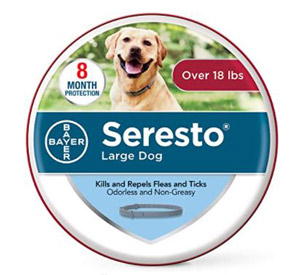July 14, 2023 - WASHINGTON - The Environmental Protection Agency on Thursday ordered warning labels be placed on Seresto flea and tick collars, which have 
Following more than 100,000 reports of harm to pets — including more than 2,700 deaths — the agency announced it will limit approval of the product to five years and require more robust reporting of harm incidents from the flea collar’s maker, Elanco.
Today’s action comes in response to a legal petition filed by the Center for Biological Diversity asking the EPA to cancel the registration of Seresto flea collars.
“We’re disappointed the EPA didn’t cancel Seresto collars, but it’s heartening that they’re alerting pet owners to the troubling risks linked to the product,” said Nathan Donley, environmental health science director at the Center. “These actions wouldn’t be necessary if due diligence was done seven years ago when concerns about this product were first brought to light, but better late than never.”
As a result of today’s announcement, Elanco will be required to warn consumers and veterinarians of side effects that have been linked to its flea collars. It also will be required to reduce the risk of strangulation by the collars and to submit much more detailed incident reports to the EPA of harm to pets.
The EPA has defended its track record on the Seresto collar by claiming that the reports, which include complaints of harm to people, may not be valid. But today’s announcement acknowledges that the agency’s incident reporting guidelines failed to require enough information to determine the cause of the harm in most incident reports.
“The EPA has just acknowledged that its incident reporting system is so inadequate that it lacks basic information to determine whether flea and tick pesticides are harming pets and the public,” said Donley. “While it’s admirable that the agency will now require better reporting for one product, similar guidelines are urgently needed for the hundreds of flea and tick products out there, as well as tens of thousands of other pesticide products. The agency’s slow response to mounting concerns linked to Seresto collars vividly demonstrates that the EPA’s incident reporting database is designed to fail. It must be overhauled.”
Seresto collars are plastic bands impregnated with insecticides that are released over time and coat an animal’s fur. The active ingredients of the flea collar are imidacloprid and flumethrin.
Imidacloprid is widely used in the United States and is among the neonicotinoid pesticides widely implicated in declines of pollinator populations. Flumethrin is a pyrethroid that has been shown to have troubling health impacts on dogs, cats and people. When combined, imidacloprid and flumethrin are believed to have synergistic effects that make them even more toxic to fleas and ticks and, potentially, to pets and people.
Seresto collars have been the subject of congressional oversight hearings and an investigation by the Office of Inspector General.
The Center for Biological Diversity is a national, nonprofit conservation organization with more than 1.7 million members and online activists dedicated to the protection of endangered species and wild places.
Source: Center for Biological Diversity








